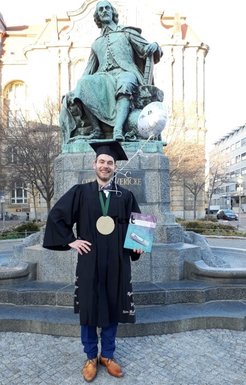Jens Bremer successfully defended his PhD thesis
Research on fixed-bed reactors and the transition towards a more sustainable fuel and chemical production.
Jens Bremer, one of our IMPRS students, successfully accomplished his PhD. He joined the IMPRS in 2014 and worked in the Group “Process Systems Engineering”. The title of his PhD thesis is “Advanced Operating Strategies for Non-Isothermal Fixed-Bed Reactors Exemplified for CO2 Methanation”.

Jens Bremer with his PhD thesis.
© Jens Bremer
His research focused on fixed-bed reactors and supported the transition towards a more sustainable fuel and chemical production. When it comes to continuous, large-scale chemical production, these reactor types are typically seen as the workhorse of the chemical industry. However, with the increasing integration of volatile renewable energies, such reactors need to perform well not only at a fixed nominal load point but under varying partial loads. By using the example of the exothermic CO2 methanation, as part of a Power-to-Gas process, his work takes up two major questions on load-flexible reactor operation:
1.) Which operating points are attainable by fixed-bed reactors?
2.) How does a fixed-bed reactor need to be operated to reach and maintain a new operating point / load?
To answer these questions, he derived a dynamic reactor model and employed numerical methods to solve it. These solutions allowed him to perform detailed in silico investigations on the reactor behavior under various dynamic scenarios (e.g., start-up, shut-down, load change). His research's key finding was that the conventional fixed-bed reactor can be operated in a much wider operating range than usually assumed. With the help of advanced control strategies, he revealed unstable operating points that can be used to operate fixed-bed reactors more flexible. He also underpins his findings with the derivation of novel criteria for reactor stability and state-space multiplicity. These criteria help to re-evaluate questions about safe reactor operation and might replace old, often conservative criteria. Furthermore, the criteria may be relevant to develop new reactor concepts and designs. In his last phase, he also conducted experiments with a specially designed pilot plant reactor setup and proved that his model and criteria are also valid under realistic conditions. Theory, modeling, and experiments turned out to be highly relevant for further developing flexible fixed-bed reactors, which makes his work an essential contribution to the current state of knowledge.












